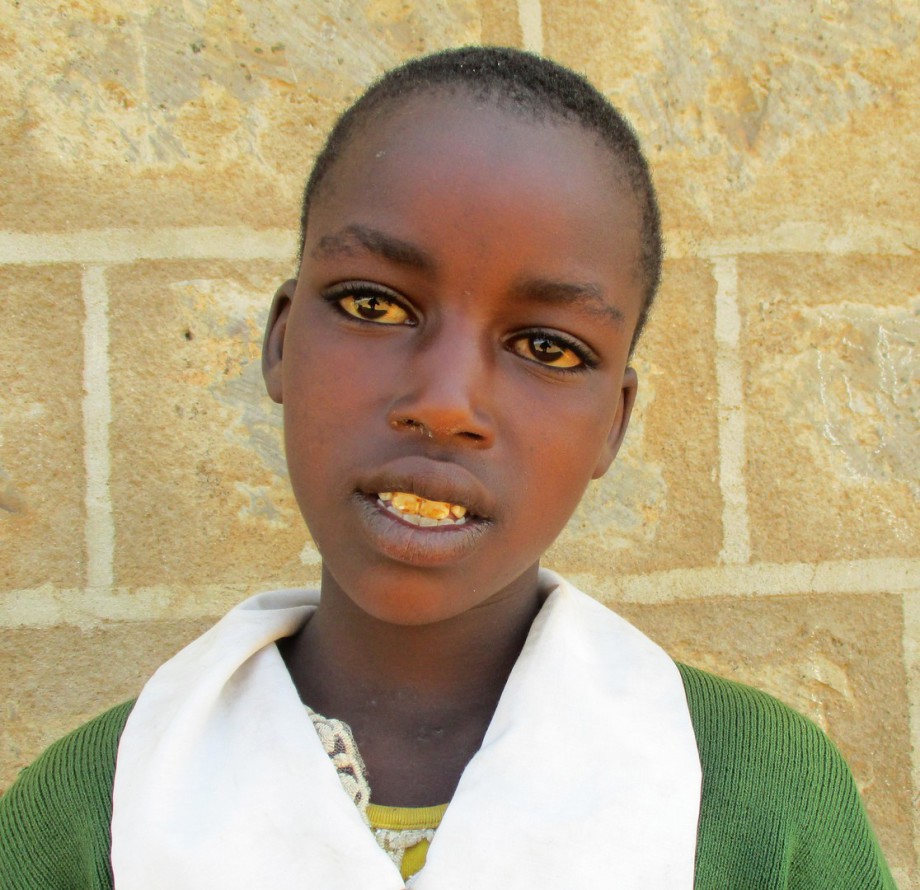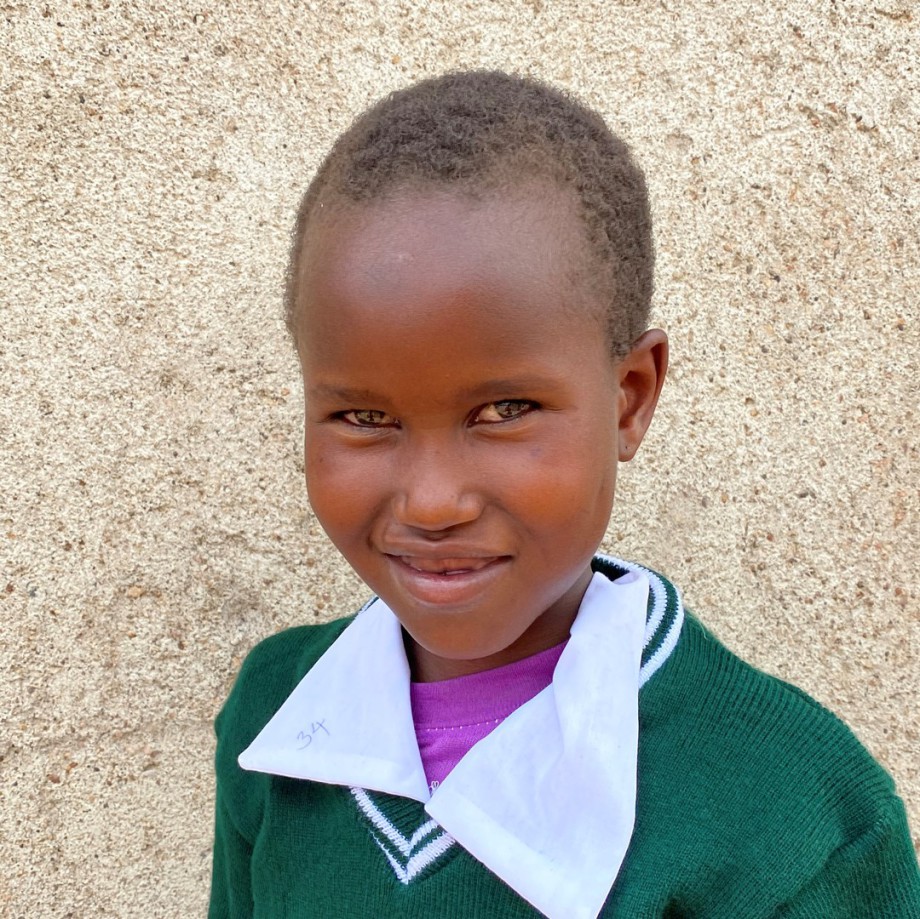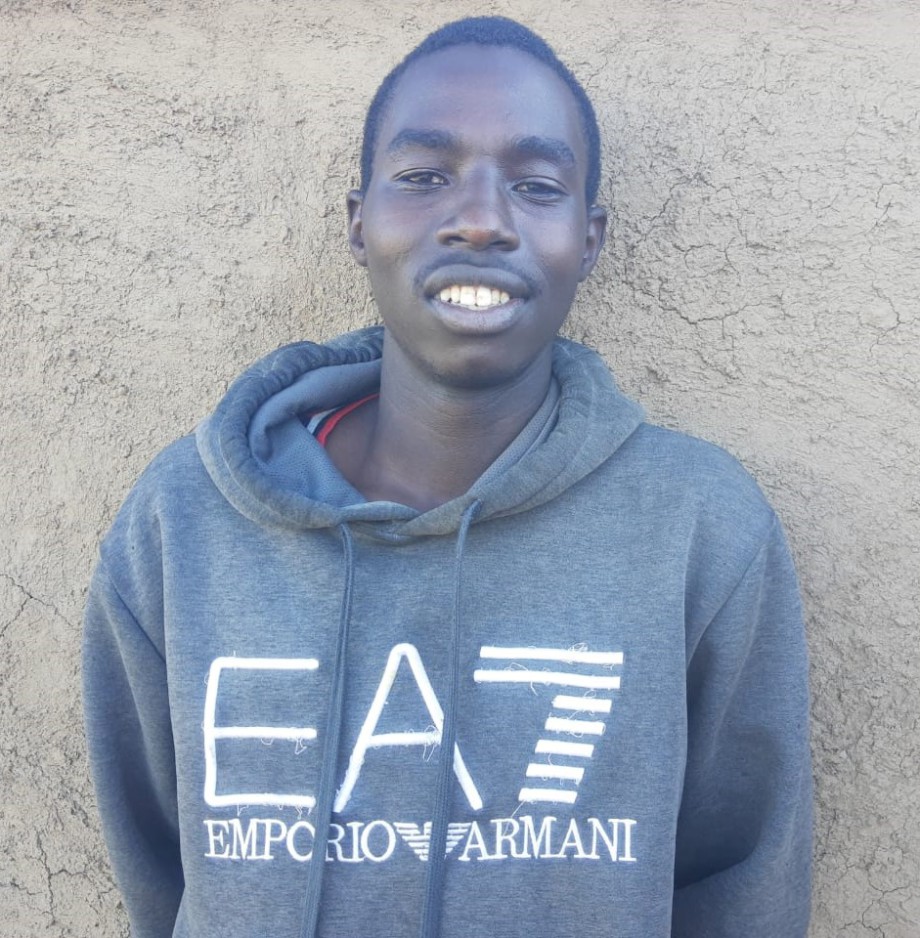Sponsor A Child
We firmly believe that a basic education is the key to a more hopeful future for the children of Kenya. While primary education (K-8) is provided free by the government, our students need uniforms, shoes, money for books and fees, as well as a nourishing daily meal. Your monthly gift of $40 per month helps us provide all of these, and keeps that child in school. Please scroll down to see children waiting for your sponsorship.
Manuel Gitau
KIB-M316
11/01/2011
Manuel is the second born child of Mr. & Mrs. Reuben Kamau. He has two brothers; Samuel is in Form 4, and Joel, who is in Std. 4 at the same school. His father, Reuben Kamau, works with CRCI and his mother runs a small family business. Both parents are born again Christians and active in Christ's service.
Manuel has enjoyed perfect health. He is very active in school both in academics and sports, and would like to be a pilot when he grows up.
Prayer request: To be able to perform well in class.
Nempiris Nkere
ILK-F47
10/09/2007
Nempiris has two sisters and three brothers, and she would like to become a teacher. Almost all of the family's livestock have been lost to drought, and iIt's difficult to earn enough provide enough support with the little income they are able to earn. As a result, the family is living in extreme poverty.
Nempiris comes from the remote community of Ilkerine located in the heart of the Maasai tribe. This community is at a mile high elevation. The majority of people live in mud houses with no electricity and no running water. The Maasai people are herdsmen and depend on their livestock for their livelihood. Often the baby animals are kept in a small room inside their mud houses. Walking is the main mode of transportation, and it is not uncommon for children to walk five miles or more to school.
Prayer Request: God's protection for the family against Covid 19.
Joshua Opiyo
KSU-M56
9/9/2007
Joshua lives with grandmother. His mom works in a different county although she often does not provide enough funds to take care of the many needs of this family, and his father is mentally challenged. Joshua's grandmother is basically the sole breadwinner of the family but is growing old and soon will not be able to afford to raise him.
Effy Omondi
KSU-F28
2/14/2006
Effy's father, Barrack, has been mentally disturbed for the last three years now. Her mother, Rebbeca, finds casual work when she can, although most of her income goes for medications for her husband so that he does not turn violent. The medicine is very expensive and the family is very needy because the local county government has denied any requests for help. Effy's brother died from malnutrition when Rebbeca was too ill to work and support her family.
Kayodo Nayonde
ILK-F54
9/21/2012
Kadoyo lives with her grandmother and pet cat in Ilkerine so that she can attend school because her parents are too poor to be able to send her. She would like to become a teacher.
Kadoyo comes from the remote community of Ilkerine located in the heart of the Maasai tribe. This community is at a mile high elevation. The majority of people live in mud houses with no electricity and no running water. The Maasai people are herdsmen and depend on their livestock for their livelihood. Often the baby animals are kept in a small room inside their mud houses. Walking is the main mode of transportation, and it is not uncommon for children to walk five miles or more to school.
Prayer Request: For rain to come to her area.
Douglas Shikoye
KIB-M312
9/11/2007
Douglas has two brothers and one sister who are being raised by their father and stepmother since their own mother abandoned them when they were very young. Their stepmother is the only mother they have really ever known. Douglas is a bright student and puts a lot of effort into his schooling. His father is a casual laborer and his stepmom sells vegetables, but they don't earn enough to even provide for the family's most basic needs let alone school fees. Douglas would like to be an accountant when he grows up.
Reginald Beniciel
KIB-M317
7/25/2019
Beniciel is being raised by a single parent, his father abandoned his mother while she was still pregnant. He has one sister. His mother works at Kibera hope center as a casual laborer, Beniciel is a very bright boy. He has not been able to go to school this term due to school fees unpaid.
Esther Diana Afandi
KIB-F318
8/31/2012
Esther is one of four siblings, she has three brothers. Her father abandoned the family, so she is raised by her single mother. Esther is a very bright girl, well articulated, and calm. She dreams to become a doctor someday to help support her family. She is on the verge of having to drop out of school due to lack of school fees.
PRAYER REQUEST: For her mother who is going through difficult times emotionally and financially.
Everline Viola
KIB-F319
5/20/2018
Everline's father abandoned the family, a few months later her mom passed away. She has one brother and they are being cared for by their grandparents. Both grandparents are unemployed and not able to cater to their basics needs well, let alone provide funds for school fees. Everline is a bright girl, and despite losing her mother at a young age she still puts a smile on her face and hopes for things to work out.
PRAYER REQUEST: Gods protection and blessing.
Fidel Owiti
KIB-M320
6/11/2011
Fidel is one of five children being raised by a single mother, his father abandoned the family. Fidel is a bright boy who loves education and dreams of becoming a doctor someday. Some days he has to stay home from school so his older siblings can go, it is hard for his mom as a casual laborer to raise funds for school fees for all five children.
PRAYER REQUEST: Gods Protection
Ivan Wambu
KIB-M321
12/25/2015
Ivan is nine years old and has one sibling. He is very disciplined and polite. He has been unable to attend school since 2022, due to his school fees not being able to be paid. His mother and father are both unemployed. His mother is sickly and unable to work, his father is a casual laborer and has worked on and off. Ivan has a desire to go to school and become a pilot.
PRAYER REQUEST: Gods protection and provision
Justus Mulimu
KIB-M322
4/28/2011
Justus is a jovial boy and loves school so much. He has two siblings, his father and mother separated and then both abandoned their children. Justus and his siblings live with their widowed grandmother. It has not been easy for their grandmother to care for three children, there is barely food on the table. Justus has accrued a lot of unpaid school fees, and is unable to be in school now because of this. He desires an education and would like to be a teacher someday.
PRAYER REQUEST: Gods protection
Ronald Owino
KIB-M323
2/1/2013
Ronald is one of seven siblings. Ronald has been off school this whole year because there is no money to pay school fees. He desires to go to school where he knows he will be able to have lunch, get an education and hopes to one day become a nurse to provide for his family. All of his siblings are home with maybe one meal a day, provided by well wishers. His parents are both unemployed.
PRAYER REQUESTS: Financial breakthrough and Gods blessings to the family.
Victortia Mwongeli
KIB-F324
2/13/2009
Victoria is one of four siblings. Her mother is a house cleaner, and her father is a casual laborer. Victoria has been on and off school due to lack to school fees being paid. She is a hard worker at home and at school. Her performance is excellent, and hopes she can continue to attend school and become a doctor/surgeon.
PRAYER REQUEST: Gods protection and blessing.
Gabriel Oloishorua
ILK-M81
3/13/2008
Gabriel has three brothers and two sisters, one of whom is his twin, Mercy. Their father works for Kenya Hope, and their mother is unemployed. Both Gabriel and Mercy are now in their final year of primary school and, due to the tremendously high cost of living, it's extremely difficult to pay the necessary school fees. The prospect for their continued education is very low under the current conditions.
Isack Sapurr
ILK-M85
7/9/2014
Isack has three brothers and one sister. Their parents are unemployed and have depended solely on selling charcoal to provide for the family's daily needs and to pay school fees. However, the government of Kenya has banned this business and declared it illegal. As a result, the family now lives in extreme poverty, and the parents are unable to send their children to school.
Brenda Saaya
ILK-F88
9/9/2010
Brenda lives with both of her parents, four brothers, and two sisters. Her father is elderly and cannot be employed. The family mostly depends on Farm produce in order to support the families basic needs. The income they earn from the farm produce is not enough to support their children with education. Brenda has been in and out of school due to lack of school fees. If she can be given a chance for education through our sponsorship she will be able to complete her studies, she hopes to become a teacher.
PRAYER REQUEST: For Gods provision
Maraga Sasine
ILK-M89
10/24/2017
Maraga lives with his parents, two brothers and a sister. His parents have been going through many challenges in life as the drought swept away their cows, which was their only source of income. Their income is not enough to support their children with education and be able to meet other basic needs of the family. This has caused some of their to be in and out of school due to unpaid school fees.
PRAYER REQUEST: For Gods provision
Margaret Seyianoi
ILK-F90
8/6/2008
Margaret lives with her parents, three brothers, and a sister. Her parents are peasant farmers, and they too depend on livestock keeping. The drought in Kenya impacted their herd, and has left them without income. The children are in and out of school, due to unpaid school fees. Margaret would love to see her education through and become a lawyer.
PRAYER REQUEST: For Gods provision
Morris Ikayo
ILK-M91
12/7/2012
Morris lives with his parents, four brothers, and two sisters. His father works for Kenya Hope as one of our Pastors, but has been sick for several years. He has been hospitalized several times, and on very expensive medications. Morris has been in and out of school due to school fees being unpaid. Morris would love to stay in school and become a doctor.
PRAYER REQUEST: For his education
Nicholas Nyatia
ILK-M92
12/12/2009
Nicholas lives with his parents, four brothers, and a sister. His parents depend on selling charcoal in order to meet the basic needs of the family. The business of burning charcoal has been declared illegal by the government of Kenya, bringing many who depend on it to have no source of income. Occasionally Nicholas has been in and out off school due to lack of school fees. Nicholas would love to continue his education and become a teacher.
PRAYER REQUEST: For his education
Timothy Senteu
ILK-M93
7/2/2012
Timothy lives with his parents, five brothers, and one sister. His parents depend on livestock keeping as source of income. Due to prolonged drought in Kenya last year all their cows died. Timothy has been in and out of school due to fees being unpaid. He would like to continue his education, and become a doctor.
PRAYER REQUEST: For the economy in Kenya
Yohana Rimoine
ILK-F94
6/10/2014
Yohana lives with his parents, four brothers, and a sister. His parents depend on peasant farming, such as keeping livestock. The drought that affected the area two years ago, killed all the cows that belonged to them leaving the family with great poverty. The children are often in and out of school due to unpaid school fees. Yohana would like to continue his education, and sponsorship would allow him to do so.
PRAYER REQUEST: For Gods provision























